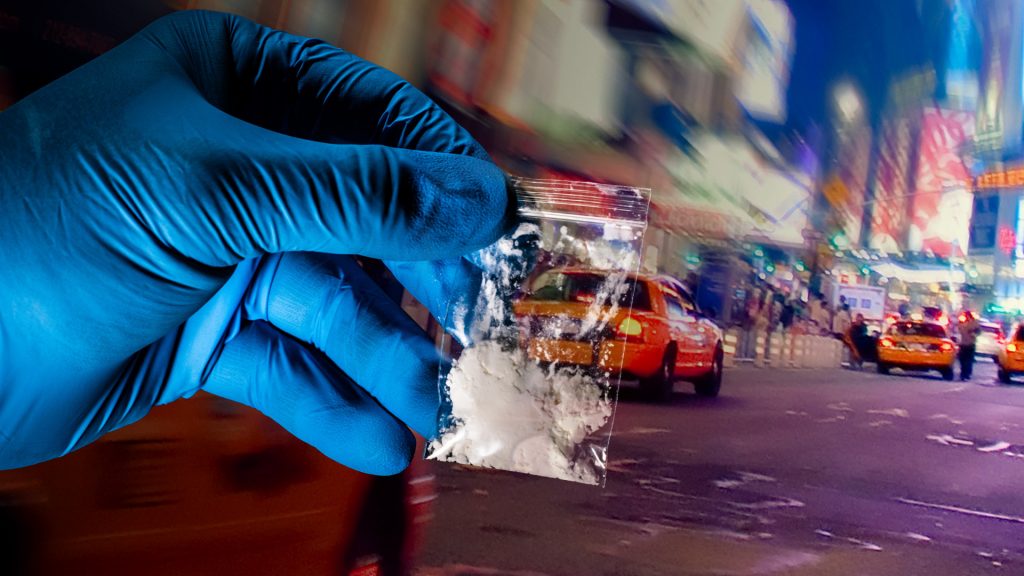Crime ring used fentanyl-laced party drugs to rob victims. NYC charged them with murder.

NEW YORK – For years, a five-man crime ring prowled outside New York City’s gay nightclubs, running a deadly hustle: Target intoxicated revelers, offer them fentanyl-laced drugs and rob them when they black out. Two victims overdosed and died in 2022.
That same year, prosecutors said, two men copied that playbook, drugging and robbing 21 people in Lower Manhattan. Five people died. In 2023, a woman allegedly ran a similar scheme that killed four more men.
Now, in a precedent-setting move, Manhattan District Attorney Alvin Bragg has charged all three cases as second-degree murders, arguing that the defendants acted with depraved indifference to human life and used fentanyl as a murder weapon.
Legal experts told Straight Arrow News this approach mirrors a national trend: as opioid deaths climb, prosecutors are increasingly treating fatal overdose events as high-level homicides. Murder convictions in New York overdose cases could embolden prosecutors across the country and raise the charging ceiling for drug-facilitated crimes.
First-ever NYC murder convictions in drug-facilitated robbery schemes
On May 28, 2022, 33-year-old political consultant John Umberger met Jayqwan Hamilton and Robert DeMaio coming out of a popular LGBTQ nightclub in Manhattan’s Hell’s Kitchen neighborhood. Hours later, Umberger was found dead of a fentanyl overdose in an Upper East Side townhouse.
“John was a son, brother and friend like no other,” Umberger’s mother Linda Clary told SAN. Clary described her son as a trusting soul who was “targeted because of his location, appearance and willingness to meet new people and have a good time.”
He looked like someone with money and “fit what the criminals wanted. Lamb to the slaughter is the description that comes to mind,” she said.
Hamilton and DeMaio offered Umberger fentanyl-laced drugs that left him motionless, then stole his belongings, withdrew more than $20,000 from his bank account and posed for selfies, according to evidence presented at trial.
“They could have saved John. Instead, they made a video snickering with John’s body on the bed,” Clary said.
Within hours of leaving Umberger lifeless in the home, the men went shopping for designer clothes and sneakers.
Hamilton and DeMaio argued at trial that the drug use was consensual and Umberger’s death was accidental and unpredictable. A Manhattan jury disagreed. On Feb. 10, jurors convicted the pair of second-degree murder, along with robbery, burglary and conspiracy. Three accomplices were also convicted for their roles in the crime spree that killed Umberger and social worker Julio Ramirez, 25, and victimized more than a dozen others.
These are the first murder convictions in New York for a drug-facilitated robbery scheme, Douglas Cohen, a spokesperson for Bragg, told SAN. The verdict is significant, legal experts said, because overdose crimes are typically charged as lesser offenses like manslaughter or criminal negligence, not as murder.
“The all-count trial conviction demonstrates the strength of the evidence,” Cohen wrote in a statement to SAN. “Through our investigation we successfully argued to the court that fentanyl was used as a fatal weapon during a robbery, which subsequently allowed us to present multiple counts of murder to the jury.”
These men showed “complete disregard for human life and had no care whether their victims lived or died,” Clary said. “It would not have felt the same if they had been convicted of manslaughter and received a lesser sentence. Manslaughter is not what happened when they murdered John.”
More defendants are charged with murder
On the heels of those convictions, Bragg’s office has filed similar murder charges in other alleged fentanyl-induced robbery cases.
Defendants Kenwood Allen and Sean Shirley are accused of drugging and robbing 21 victims in Lower Manhattan between March and December 2022. Prosecutors alleged the pair targeted wealthy-looking, intoxicated patrons outside downtown bars, offered them fentanyl-laced drugs and cigarettes, then stole phones, wallets, credit cards and IDs. Using this loot, the defendants withdrew cash from ATMs, transferred funds and bought luxury goods, prosecutors said.
“Many of the victims were later found unconscious on the street,” according to the indictment. Five victims died – four within just 15 days.
Both men pleaded not guilty; their respective attorneys declined to comment. In court filings reviewed by SAN, Allen’s lawyers argued that Allen may not have predicted the drugs were deadly, especially when he used them himself.
The defense also attacked prosecutors’ untested legal argument that offering someone drugs can constitute “physical force,” a requirement for robbery under New York law. Prosecutors must first prove robbery – a felony – to establish second-degree murder under the felony-murder rule. Alternatively, they could secure a second-degree murder conviction by proving the pair acted with “depraved indifference to human life.”
Allen and Shirley are scheduled to appear in court on Nov. 25.
In September, prosecutors also charged Tabitha Bundrick with second-degree murder and other crimes, alleging she gave four men fentanyl-laced drugs she claimed were cocaine and robbed them while they were unconscious. Prosecutors said she lured these men with offers of sex work. Three of the men died. Bundrick has pleaded not guilty, and her attorney declined to comment. Her next court date is Jan. 7, 2026.
Prosecutors nationwide are bringing more serious charges in fatal overdose cases, experts say
The New York cases reflect a national shift. “We’re seeing prosecutors become more aggressive,” bringing higher level charges like homicide and murder in cases of fatal drug overdoses, Alex Kreit, director of the Chase Center on Addiction Law and Policy, told SAN.
State lawmakers are also raising the stakes. In 2023 and 2024, 30 states introduced new “drug-induced homicide” laws that allow prosecutors to bring homicide charges when someone supplies drugs that cause a fatal overdose, even without an intent to kill. Thirty-three states and Washington, D.C., now have these laws on the books, according to the Drug Policy Alliance.
New York – where the Centers for Disease Control and Prevention reported that 3,408 people died from drug overdoses in 2023 – does not, although such bills have been proposed.
Critics argue the laws go too far, often ensnaring addicts who unwittingly share dangerous drugs with friends or family, or low-level dealers unaware of what exactly they’re selling. They might also deter fellow drug users from calling 911 when someone is overdosing.
Nevertheless, the alleged conduct in the New York cases seems so egregious that a “drug-induced homicide” law is not needed to at least charge these defendants with murder, Jeffrey Fagan, a criminal law professor at Columbia Law School, told SAN.
Kreit agreed. If, as alleged, the defendants meant to drug their victims to unconsciousness, then prosecutors might show they created a “grave risk of death,” an element of second-degree murder, Kreit said. But another scenario – where a drug user happens to pass out, the defendant then decides to snatch his wallet, and the user later dies – probably would not amount to murder, Kreit explained.
Bragg is pressing ahead.
“We will continue to prosecute these types of deadly schemes and advocate for proactive measures to protect New Yorkers,” Cohen wrote to SAN.
Clary said she is glad and grateful that her son’s killers have been put away for decades, and hopes the murder convictions deter others, but “unless these men can bring John back to life, there is no justice.”
The post Crime ring used fentanyl-laced party drugs to rob victims. NYC charged them with murder. appeared first on Straight Arrow News.





